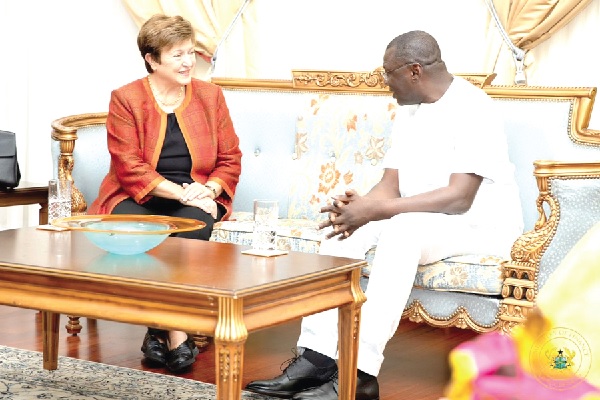
Fiscal discipline in election year: IMF boss confident Ghana will stay course
The Managing Director of the International Monetary Fund (IMF), Kristalina Georgieva says she is leaving Accra with a strong confidence that Ghana will stay the course of its three-year US$3 billion programme with the fund despite 2024 being an election year.
Advertisement
Ms Georgieva, who was on a three-day visit to Ghana, said during her visit, she received firm assurances from all authorities that the country would not deviate from the programme.
“I heard it from virtually everyone, I heard it from the President, the Vice-President, the Minister of Finance and the Central Bank Governor so I’m leaving Accra with a strong confidence that the programme will be implemented,” she said in response to a question from the Graphic Business at a press briefing in Accra.
She said she could confirm that the government was strongly committed to implementing the programme and go through with the agreed reforms. After a difficult two years marked by high inflation which peaked at a 22-year high of 54.1%, an unsustainable public debt which represented 93.5% of GDP and a weakening currency, Ghana’s economy appears to be on the path of recovery, with macro-economic stability emerging once again.
Inflation dropped to 23.6% in December 2023, GDP Growth rebounded strongly averaging 3.2% in the first two quarters of 2023, the cedi has also fairly stabilised against the US dollar, depreciating by 6.4% on a cumulative basis between February and November 2023, compared to 53.9% over the same period in 2022.
All of this has been possible just months after implementing the three-year extended credit facility programme with the IMF.
With Macroeconomic stability emerging once again, the key challenge for the country in 2024 has to do with the upcoming elections, considering that elections in this country have always been characterised by huge fiscal deficits. It will be recalled that before the 2016 election, Ghana was under an IMF programme which started in April 2015 and had chalked up a lot of successes in the first year.
However, the successes were all sacrificed in the 2016 election year, with the country recording a budget deficit of 8.7% against a programme target of 5.3%. This meant the IMF programme, which was expected to be completed in 2018, had to be extended for a further year.
Lessons learnt
Ms Kristalina said she was confident that this would not repeat itself because the country has learnt its lessons. “I believe that lessons have been learnt from the past that abandoning fiscal discipline for short-term gains does not pay back,” she stated.
She cautioned that 2024 was a different year and the world was more uncertain, stating that “we are in a more shock-prone economy.”The IMF boss said the fund would also help the government to stay the course through its regular engagements where they will assess the progress of the programme.
“The next review mission is in April and to continue to disburse under the programme, we have to demonstrate to our board of directors that the indicators are respected so that will be our way to give a helping hand to stay the course,” she said.
Election year slippages
In 2004, despite the country just benefiting from the HIPC initiative which led to a total debt relief of US$3.5 billion, Ghana still recorded a budget deficit of 3.2% of GDP against a target of 1.7%. In 2008, which was another election year, the budget deficit went into double digits and more than double what was budgeted for, recording 11.5% of GDP against a projection of four per cent.
The story was no different in 2012 as the country recorded a budget deficit of 12% against a target of 6.7%. In 2016, despite being under an IMF programme, the government still missed its budget deficit target.
The overall budget deficit on a cash basis was the equivalent of 8.7% of GDP against an IMF programme target of 5.3% of GDP.
On a commitment basis, the fiscal deficit was 10.3 per cent of GDP. In 2016, right under the watch of the IMF, the country recorded a budget deficit of 8.7% against a target of 5.3%. In 2020, COVID-19 expenses coupled with election-year spending led to the missing of the deficit target.
The overall budget deficit on a cash basis was 11.7% of GDP against a revised target of 11.4% of GDP. In 2024, the government has set a budget deficit target of 5.9 of GDP.





